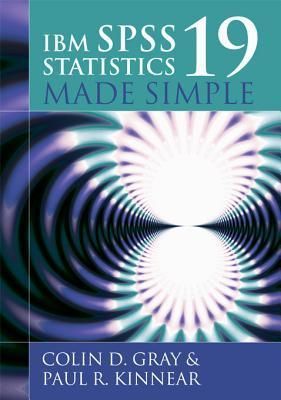
IBM SPSS Statistics 19 Made Simple
This new edition of one of the most widely read textbooks in its field introduces the reader to data analysis with the most powerful and versatile statistical package on the market: IBM SPSS Statistics 19. Each new release of SPSS Statistics features new options and other improvements. There remains a core of fundamental operating principles and techniques which have continued to apply to all releases issued in recent years and have been proved to be worth communicating in a small volume. This practical and informal book combines simplicity and clarity of presentation with a comprehensive treatment of the use of IBM SPSS Statistics 19 for the description, exploration and confirmation of data. As in earlier editions, coverage has been extended to address the issues raised by readers since the previous edition. In this edition, there is an introduction to the Analysis of Covariance (ANCOVA). Each statistical technique is presented in a realistic research context and is fully illustrated with annotated screen shots of SPSS dialog boxes and output. The first chapter sets the scene with a survey of typical research situations, key terms and clear signposts to the location of each technique in the book. It also offers guidance on the choice of statistical techniques, and advice (based on the American Psychological Association’s guidelines) on how to report the results of a statistical analysis. The next chapters introduce the reader to the use of SPSS, beginning with the entry, description and exploration of data. There is also a full description of the capabilities of the versatile Chart Builder. Each of the remaining chapters concentrates on one particular kind of research situation and the statistical techniques that are appropriate. In summary, IBM SPSS Statistics 19 Made Simple Gets you started with SPSS. Shows you how to describe and explore a data set with the help of SPSS’s extensive graphics and data-handling menus. Helps you to choose appropriate statistical techniques. Warns you of pitfalls arising from the misuse of statistics. Shows you how to report the results of a statistical analysis. Shows you how to use Syntax to implement some useful procedures and operations. Introduces the reader to the analysis of covariance (ANCOVA) Has a comprehensive glossary. Is now presented in an attractive two-colour format. The book’s accompanying website contains datasets for the chapters of the book, as well as a large body of exercises (with data sets), and notes on statistical terms. Instructor resources include a PowerPoint lecture course and Multiple-Choice Question tests, which are also available free of charge to lecturers adopting the book and their students. Please visit http://www.psypress.com/spss-made-simple for more details.